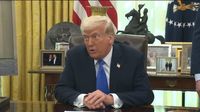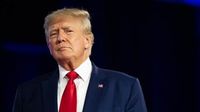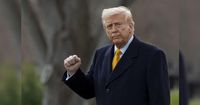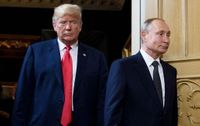In a significant development on March 24, 2025, US President Donald Trump expressed optimism about a potential agreement between Washington and Kyiv regarding the distribution of revenues from Ukraine's valuable mineral resources. Trump made these statements during a cabinet meeting where he outlined the US's growing interest in Ukraine's resources, particularly rare earth minerals. The discussions followed a meeting held the previous day, March 23, between American officials and their Ukrainian counterparts, aimed at addressing various matters including energy and ownership of power plants.
Trump stated, "We're talking about territory right now. We're talking about lines of demarcation, power plant ownership. Some people are saying the United States should own the power plant...because we have the expertise," emphasizing the need for US involvement in Ukraine's energy sector. This involvement arises from a broader strategy to secure vital resources while ending the ongoing conflict with Russia.
The talks in Riyadh, Saudi Arabia, included discussions with Russian officials on the same day as Trump’s statements. The US delegation's focus was primarily on negotiating a ceasefire in the Black Sea while also considering the potential ownership stakes in Ukrainian infrastructure. The conflict, which has persisted for years, has had significant implications for both nations, particularly concerning safety and commerce within the region.
However, the talks between the US and Russia encountered immediate challenges as Ukraine accused Russia of conducting "hollow" peace negotiations. Ukrainian Foreign Minister Andrii Sybiha criticized the Kremlin after a recent missile strike in Sumy that resulted in injuries to civilians, stating that these acts undermine the chances for genuine peace discussions. This missile strike, which injured 88 individuals including 17 children, occurred during the US-Russian negotiations and has further escalated tensions.
The complexity of securing access to Ukraine's mineral wealth adds another layer to the negotiations. Many of the minerals critical to the United States are located in areas under Russian control or near the front lines of ongoing battles, making them difficult to access. Experts like Wolf-Christian Paez from the International Institute for Strategic Studies have raised concerns that without a stable peace, extracting these minerals constitutes a significant hurdle. He remarked that the bulk of reserves are inaccessible due to the current conflict and skepticism surrounds the feasibility of mining operations in these contested areas.
Despite the challenges, Ukraine's government has remained committed to signing an agreement that would establish a joint investment fund for managing revenues from the country's natural resources. This framework agreement aims to pave the way for international investments despite the ongoing conflict. Initially, this agreement was to be signed during President Volodymyr Zelenskyy’s visit to the US on February 28, 2025, but complications led to its postponement after a tense meeting with Trump.
Trump's assertion includes a pivot towards leveraging US military support in exchange for access to Ukraine's resources, which is implied in both his comments on increased weapon supply and the mineral deal. He indicated that a deal for rare earth minerals was “just about completed,” but the practicality of this agreement rests on resolving the conflict, as Trump himself highlighted the current unfair financial burden on the US.
The urgency of a ceasefire has also become a central theme in these discussions. Trump has advocated for a halt to hostilities, proposing terms that would protect energy infrastructure while allowing safe commercial shipping, especially in the Black Sea, a critical route for many nations. However, reaching consensus on what constitutes 'protected' targets has proven contentious, with differing interpretations from the US and Russia.
Former ambassador Steve Witkoff expressed hope for progress in talks taking place in Saudi Arabia, where both US and Russian negotiators aimed to find common ground. However, as evidenced by ongoing missile strikes and drone attacks, including a recent barrage targeting civilian infrastructure, concrete steps towards peace seem tenuous at best.
As the political landscape shifts and the humanitarian crisis deepens, many observers question the long-term viability of any agreements forged. The urgency for peace and the desire for resource control present a volatile mix, complicating the path forward for both nations and their allies.
In summary, as conversations around Ukraine's mineral wealth and energy infrastructure intensify, the clarity of intentions from both sides remains murky. The intertwined issues of military presence, resource control, and the desperate need for a ceasefire create a complex narrative underscoring the urgency of this geopolitical situation.









